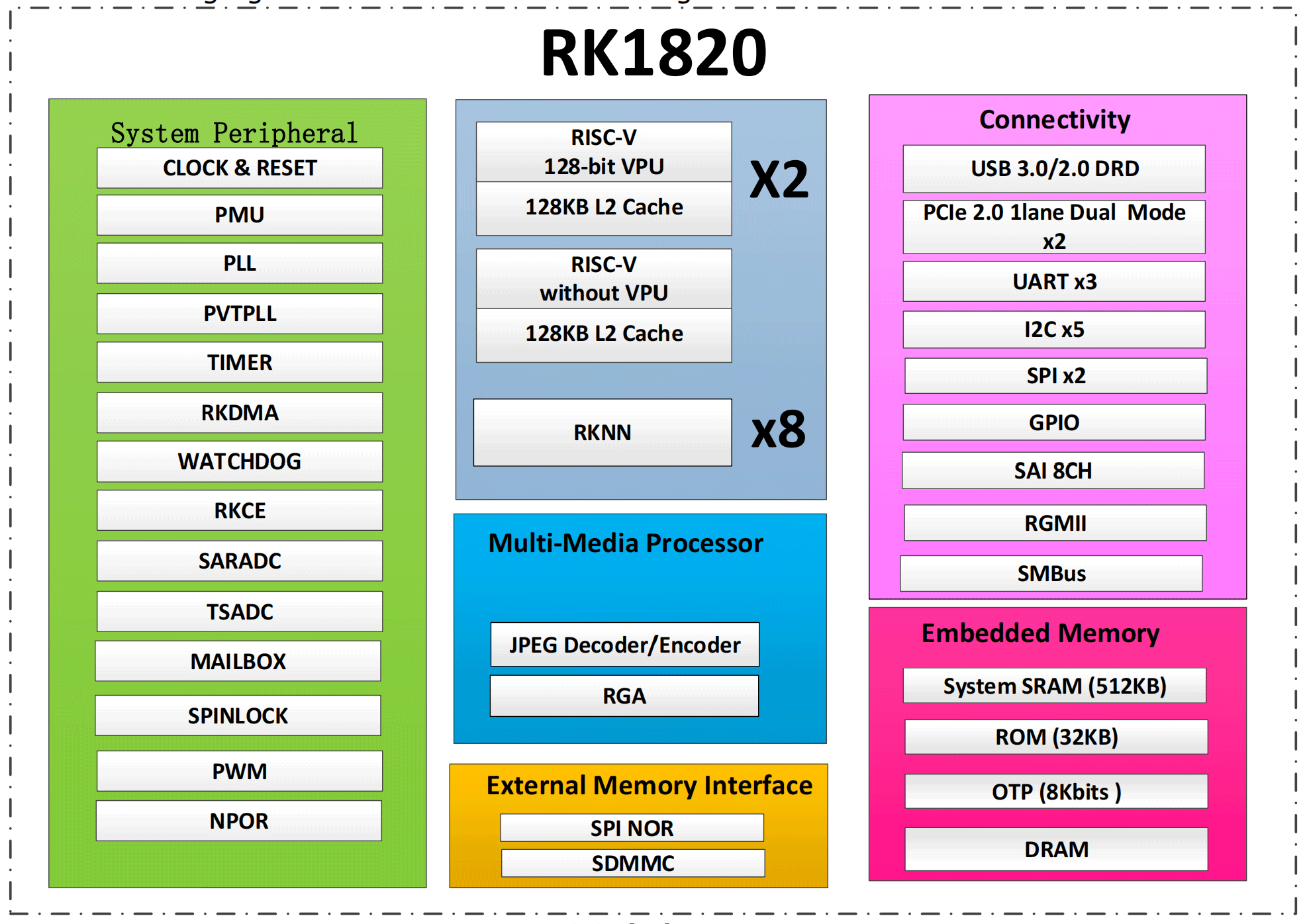When edge devices can run multi-billion-parameter models and AI no longer relies entirely on cloud compute, Rockchip’s RK1820—integrating ultra-high-bandwidth on-chip DRAM and a multi-core NPU targeting 3 B/7 B LLM/VLM, with mainstream-framework support and a universal API for easy development—teams with host chips like RK3588 to build a powerful AI platform. Its multimodal capabilities enable speech recognition, video analysis, long-context dialogue and more for security, robotics, automotive, consumer, office, education, home and industrial edge applications.

| Category | Sub-item | Specifications |
| Core Processor | Core Configuration | 3 independent 64-bit RISC-V cores (SRV, VRV0, VRV1) |
| ISA | SRV: RV64GCB; VRV0/VRV1: RV64GCBV | |
| FPU | All cores integrate FPU supporting RISC-V H/F/D precision | |
| Cache | Per core: 32 KB L1 I-Cache + 32 KB L1 D-Cache + 128 KB L2 Cache | |
| Vector Unit | VRV0/VRV1 integrate 128-bit vector unit | |
| Memory | On-Chip Memory | Boot ROM (SPI/eMMC/SD/MMC boot, UART/PCIe download) |
| System SRAM: 512 KB | ||
| On-chip DRAM: 5 GB | ||
| 32 KB ROM + 8 Kbits OTP (6.5 Kbits secure, P/R/I modes) | ||
| External Memory | Combo SDMMC: eMMC 4.51 (HS200, 1/4/8-bit), SD 3.0/MMC 5.1 (1/4-bit), SDIO 3.0 (4-bit) | |
| FSPI: 1/2/4-bit, 2 chip-selects | ||
| System | Clock & Reset (CRU) | 4 PLLs, 24 MHz osc; per-unit clock gating & soft-reset |
| PMU | Multi-mode power saving; 3 domains (VDD_TOP, VDD_LOGIC, VDD_PMU) | |
| Timers | 6 × 64-bit counters (free-run/user-mode, status readable) | |
| Watchdog | 3 × 32-bit; reset or interrupt-then-reset | |
| Interrupt Controller | SRV: 160 sources; VRV: 64 sources; m/s-mode SW IRQ, level/edge, prio SW-config | |
| DMAC | 2 phys ch, 22 peri req, 24 log ch; M-M/M-P/P-M, linked-list, 3 multi-block modes | |
| Security | Crypto Engine | AES-128/192/256, SM4; SHA-1/256/224, MD5, SM3; RSA 4096, ECC 256, SM2 |
| Key Ladder | Root key from OTP/RKRNG, derivable to modules | |
| Mailbox | 12 mailboxes for inter-core messaging | |
| Multimedia | JPEG Codec | Enc: baseline DCT, 16×16–65520×65520, YUV400/420/422/444 |
| Dec: baseline DCT, 48×48–65520×65520, YUV400/420/422/440/411/444, RGB888/565 | ||
| NPU | 20 TOPS INT8; INT4/8/16, FP8/16/BF16; frameworks: TF, Caffe, TFLite, PyTorch, ONNX, Android NN | |
| 2D Graphics (RGA) | ARGB/RGB/YUV/TILE I/O; BT.601/BT.709; 8192×8192 src / 4096×4096 dst; 1/16–16× scale, rot 0/90/180/270 + mirror, block-copy/alpha-blend/OSD | |
| SAI | 1× 4TX+4RX lanes, I2S/PCM/TDM, 128 slots (8–32 bit) | |
| Connectivity | Ethernet | 1× RGMII, 10/100/1000 Mbps, full/half, TSO/USO, IEEE 1588 timestamp |
| USB | USB 2.0 DRD (EHCI/OHCI); 2 PHYs supporting USB 3.0 DRD/dev/host + USB 2.0 OTG | |
| PCIe | PCIe 1.x, 1 lane RC only, 2.5/5.0 Gbps per lane per dir | |
| SPI | 2 controllers, 2 chip-selects, master/slave SW-select | |
| I2C | 5 host ports, 7/10-bit addr, 100 k/400 k/1 Mbit/s | |
| SMBus | 1 slave interface, multi-protocol, PEC/Alert/UDID, clock-stretch | |
| UART | 3 ports, 64-byte FIFO, 5–8 bit, up to 4 Mbps; UART2 auto-flow/RS485 | |
| PWM | 1× 8-ch, input-capture/continuous/one-shot, 2-level divider, power-key/freq/counter | |
| Other | GPIO | Multiple banks, irq (level/edge, polarity), pull-up/down, drive-strength |
| Temp Sensor (TS-ADC) | 3 ch, ?40–125 °C, ±3.5 °C, 0.1 °C res, user/auto alarm/reset | |
| SARADC | 1×, 2 single-ended inputs, 13-bit, 2 MS/s, single/continuous | |
| Package | Type | FCBGA 746L, 19 mm × 19 mm body, 0.35 mm ball, 0.65 mm pitch |

RK1820 integrates three 64-bit RISC-V cores (each with FPU), every core offering 32 KB I-cache + 32 KB D-cache + 128 KB L2 cache. The on-chip NPU supports mixed-precision (INT4 / INT8 / INT16 / FP8 / FP16 / BF16) and delivers up to 20 TOPS (exact value depends on precision / model). The main RISC-V core handles model scheduling, control and I/O, while the NPU focuses on inference. Ultra-high-bandwidth on-chip DRAM is built in, and PCIe 2.0 plus USB 3.0 PHYs ease connection to host processors / SoCs.

Supports on-device execution of 3B/7B-scale LLM/VLM models, enabling offline deployment of up to 7B parameters for video summarization, image-recognition assistance, and multimodal perception. When running a 7B model, RK1820 delivers approximately hundreds of tokens per second (actual performance varies with model structure, quantization precision, I/O bandwidth, and host-cooperation efficiency).
RK3588 + RK1820 application examples: security-video structuring & retrieval, full-modal interactive assistant, AI-Codec; simultaneous interpretation, virtual digital human.
Target markets: security, robotics, automotive, consumer electronics, education/learning devices, AI-assist equipment, industrial gear, AIoT terminals—delivering on-device video summarization, image recognition, multimodal perception.

